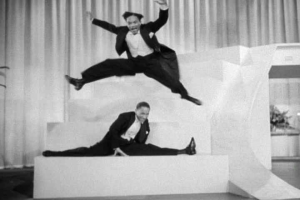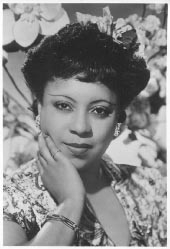Related Research Articles

Gregory Oliver Hines was an American dancer, actor, choreographer, and singer. He is one of the most celebrated tap dancers of all time. As an actor, he is best known for Wolfen (1981), The Cotton Club (1984), White Nights (1985), Running Scared (1986), The Gregory Hines Show (1997–1998), playing Ben on Will & Grace (1999–2000), and for voicing Big Bill on the Nick Jr. Channel animated children's television program Little Bill (1999–2004).

The Cotton Club was a New York City nightclub from 1923 to 1940. It was located on 142nd Street and Lenox Avenue (1923–1936), then briefly in the midtown Theater District (1936–1940). The club operated during the United States' era of Prohibition and Jim Crow era racial segregation. Black people initially could not patronize the Cotton Club, but the venue featured many of the most popular black entertainers of the era, including musicians Fletcher Henderson, Duke Ellington, Jimmie Lunceford, Chick Webb, Louis Armstrong, Count Basie, Fats Waller, Willie Bryant; vocalists Adelaide Hall, Ethel Waters, Cab Calloway, Bessie Smith, Lillie Delk Christian, Aida Ward, Avon Long, the Dandridge Sisters, the Will Vodery choir, The Mills Brothers, Nina Mae McKinney, Billie Holiday, Midge Williams, Lena Horne, and dancers such as Katherine Dunham, Bill Robinson, The Nicholas Brothers, Charles 'Honi' Coles, Leonard Reed, Stepin Fetchit, the Berry Brothers, The Four Step Brothers, Jeni Le Gon and Earl Snakehips Tucker.

Bill "Bojangles" Robinson, was an American tap dancer, actor, and singer, the best known and the most highly paid black entertainer in the United States during the first half of the 20th century. His long career mirrored changes in American entertainment tastes and technology. His career began in the age of minstrel shows and moved to vaudeville, Broadway theatre, the recording industry, Hollywood films, radio, and television.

The Nicholas Brothers were an entertainment act composed of brothers, Fayard (1914–2006) and Harold (1921–2000), who excelled in a variety of dance techniques, primarily between the 1930s and 1950s. Best known for their unique interpretation of a highly acrobatic technique known as "flash dancing", they were also considered by many to be the greatest tap dancers of their day, if not all time. Their virtuoso performance in the musical number "Jumpin' Jive" featured in the 1943 movie Stormy Weather has been praised as one of the greatest dance routines ever captured on film.

Harold Lloyd Nicholas was an American dancer specializing in tap. Nicholas was the younger half of the tap-dancing pair the Nicholas Brothers, known as two of the world's greatest dancers. His older brother was Fayard Nicholas. Nicholas was featured in such musicals as An All-Colored Vaudeville Show (1935), Stormy Weather (1943), The Pirate (1948), and The Five Heartbeats (1991).
Theatre Owners Booking Association, or T.O.B.A., was the vaudeville circuit for African American performers in the 1920s. The theaters mostly had white owners, though about a third of them had Black owners, including the recently restored Morton Theater in Athens, Georgia, originally operated by "Pinky" Monroe Morton, and Douglass Theatre in Macon, Georgia owned and operated by Charles Henry Douglass. Theater owners booked jazz and blues musicians and singers, comedians, and other performers, including the classically trained, such as operatic soprano Sissieretta Jones, known as "The Black Patti", for black audiences.

Adelaide Louise Hall was an American-born UK-based jazz singer and entertainer. Her career spanned more than 70 years from 1921 until her death. Early in her career, she was a major figure in the Harlem Renaissance; she became based in the UK after 1938. Hall entered the Guinness Book of World Records in 2003 as the world's most enduring recording artist, having released material over eight consecutive decades. She performed with major artists such as Art Tatum, Ethel Waters, Josephine Baker, Louis Armstrong, Lena Horne, Bill "Bojangles" Robinson, Cab Calloway, Fela Sowande, Rudy Vallee, and Jools Holland, and recorded as a jazz singer with Duke Ellington and with Fats Waller.

Shuffle Along is a musical composed by Eubie Blake, with lyrics by Noble Sissle and a book written by the comedy duo Flournoy Miller and Aubrey Lyles. One of the most notable all-Black hit Broadway shows, it was a landmark in African-American musical theater, credited with inspiring the Harlem Renaissance of the 1920s and '30s.

Cora "Lovie" Austin was an American Chicago bandleader, session musician, composer, singer, and arranger during the 1920s classic blues era. She and Lil Hardin Armstrong are often ranked as two of the best female jazz blues piano players of the period.

Clarence Muse was an American actor, screenwriter, director, singer, and composer. He was the first African American to appear in a starring role in a film, 1929's Hearts in Dixie. He acted for 50 years, and appeared in more than 150 films. He was inducted into the Black Filmmakers Hall of Fame in 1973.
The Silver Belles were an American female tap dance troupe established in Harlem, New York City.

Mildred Dixon was a dancer at the Cotton Club in Harlem, New York City, who became a longtime companion of composer and musician Duke Ellington, and manager of his company. She was born in Boston, Massachusetts, to parents from Africville, Nova Scotia. She became a dancer and moved to New York in the mid-1920s, where she became known as part of the dance couple, "Mildred and Henri."
Jimmy Mordecai also known as James Mordecai was a Harlem-based jazz tap dancer in the 1920s and 1930s. He featured in the 1929 short film St. Louis Blues starred in the 1930 Vitaphone Varieties musical short film Yarmekraw based on James P. Johnson's song of the same name.

Leonard Harper was a producer, stager, and choreographer in New York City during the Harlem Renaissance in the 1920s and 1930s.
The Cotton Club Boys were African American chorus line entertainers who, from 1934, performed class act dance routines in musical revues produced by the Cotton Club until 1940, when the club closed, then as part of Cab Calloway's revue on tour through 1942.
Margot Webb was a professional dancer trained in ballet, waltz, tango, and bolero. She and her dance partner, Harold Norton, were one of the first African American ballroom teams and were known professionally as “Norton and Margot”.
Juanita Boisseau, also known as Juanita Boisseau Ramseur, was an American dancer. She is best known for starring at the world famous jazz club Cotton Club in New York.
Ludie Olivia Jones was an American dancer. Jones was part of the Harlem Renaissance and started tap dancing at an early age. She had an early career that spanned the 1930s to the 1950s and was revived in the 1980s. Jones continued to dance and teach tap dance well into her later years.

Cora Green was an American actress, singer, and dancer, billed as "The Famous Creole Singer".
That's the Spirit is an American short musical film released in 1933. It features an African American cast starring Noble Sissle and was directed by Roy Mack. The Vitaphone film was distributed by Warner Brothers. The film survives.
References
- 1 2 3 4 5 "Tap Dance in America: A Short History". Library of Congress. Retrieved 2019-12-12.
- ↑ "Women's History Month 2013: Cora LaRedd! – dogpossum.org". 4 March 2013. Retrieved 2019-12-12.
- ↑ "Harlem Renaissance". History. Retrieved 2019-12-12.
- ↑ "Routledge". Routledge.com. Retrieved 2019-12-12.
- ↑ Magazine, Harlem World (2016-08-11). "Cora La Redd, Harlem's "Terpsichorean Riot," -1968 (Video)". Harlem World Magazine. Retrieved 2024-01-31.
- ↑ "Change Your Luck Broadway @ George M. Cohan's Theatre - Tickets and Discounts". Playbill. Retrieved 2019-12-12.
- ↑ "Encyclopedia of the Harlem Renaissance". cw.routledge.com. Retrieved 2019-12-12.
- ↑ Cora LaRedd Gets Jiggy, 1933, 6 December 2016, retrieved 2019-12-12